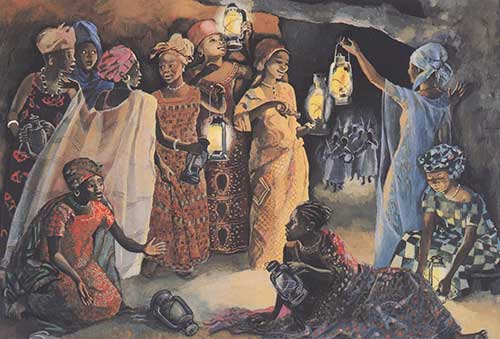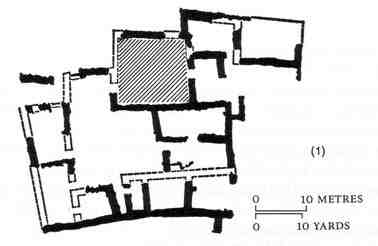
Let us pray (in silence) [to live in the freedom God gives us]
Pause
Almighty and most tender-hearted God, [or Compassionate God]
through your inexhaustible goodness,
keep us from all that may hurt us,
so that, ready in both mind and body,
we may, with free hearts, pursue your purpose;
through Jesus Christ
who is alive with you,
in the unity of the Holy Spirit,
one God, now and for ever.
Amen.
The above ancient prayer is used by Roman Catholics and Episcopalians/Anglicans (but not necessarily on the same day). It has a long, shared history which you can find here with commentary and reflection: Ordinary 32 or below. The above is my rendering in my Book of Prayers in Common.
Lectionary Readings Introduction
This site provides something different: many sites and books provide a brief summary of the reading – so that people read out or have in their pew sheet an outline of what they are about to hear. They are told beforehand what to expect. Does this not limit what they hear the Spirit address them? This site provides something different – often one cannot appreciate what is being read because there is no context provided. This site provides the context, the frame of the reading about to be heard. It could be used as an introduction, printed on a pew sheet (acknowledged, of course), or adapted in other ways.
Joshua 24:1-3a, 14-25
Some scholars point to treaties between two equals or unequal (suzerainty) of the 14-13th centuries BCE. Most of the elements are found here: naming, description of relationship, conditions, how the treaty will be preserved, witnesses (deities), curses and blessings. Covenant theology, however, does not appear to have been well established in Israel until the Deuteronomists (8-7th century BCE). Land-grant treaties of Assyrians had land entrusted to individuals to use. Deuteronomistic terminology has been clear from Joshua’s “final speech” in chapter 23.
Wisdom of Solomon 6:12-16
The Wisdom of Solomon was probably written in Egypt (most likely Alexandria). It was written in Greek by a hellenized Jew. Scholars vary in dating it from 250 BCE to 150 CE. The original readers would have recognised the goddess Isis in the images of Lady Wisdom. The significance of Isis extends beyond this metaphorical influence into iconographical influence as shown in the image here of Isis and Horus, a bronze Egyptian statue from the Ptolomeic era, compared with Our Lady of Perpetual Help with Jesus.
Amos 5:18-24
Amos probably lived a s a prophet in the 750s BCE. His oracles appear edited during the Babylonian exile (587-539BCE). This is the first biblical mention of the “Day of the Lord”.
1 Thessalonians 4:13-18
Two decades after Jesus’ death and resurrection Paul still clearly indicates his conviction he will be alife when Jesus returns (verse 17). Paul is addressing the concerns of those alive as they see loved ones dying and Christ not yet returned.
Matthew 25:1-13

The floor-plan of the first century house of St Peter in Capernaum (illustrated from The Holy Land: An Oxford Archaeological Guide (Oxford Archaeological Guides)
“The city’s basalt houses are grouped around two large courtyards, one to the north and the other to the south. One large room in particular, near the east side and joining both courtyards, was especially large (sides about 7.5 meters long) and roughly square. An open space on the eastern side contained a brick oven. A threshold which allowed crossing between the two courtyards remains well-preserved to this day.”Wikipedia (link off this site) In such a complex lived Jonah, his sons Andrew and Simon (Peter), Simon’s wife, possible children, mother in law. The patrilocal practice of marriage meant that the bride moved in to the home prepared by the groom in or adjacent to that of his father. The marriage celebration includes the groom with his relatives going to the bride’s family home to bring her to his home where the celebration continued. The “virgins” of the story (“bridesmaids” NRSV) were young nubile teenagers, his sisters and cousins. The “lamps” were flaming torches which helped one see outside. In this Mediterranean society, whenever the significant person arrives is “on time”.
Reflection on the Collect
The original is:
Omnipotens et misericors Deus, universa nobis adversantia propitiatus exclude, ut, mente et corpore pariter expediti, quae tua sunt liberis mentibus exsequamur.
Once again Episcopalians (Anglicans) and Roman Catholics pray the same prayer, even if on different days.
In the Gelasian Sacramentary, this is the first collect in the 15th of 16 Sunday Masses (#1234). In the Supplement to the Gregorian (#1186) it is for the 20th Sunday after the Pentecost octave. This is the equivalent of Trinity 20 where it is found in the Sarum Missal and all BCPs from 1549 to 1928.
misericors – compassionate; tender-hearted
universa nobis adversantia exclude – exclude all things that oppose us
propitiatus (passive) – having been rendered favourable
ut quae tua sunt liberis mentibus exsequamur – that we may carry out with free spirit things which are yours
mente et corpore pariter expediti – having been freed in mind and body [
expedire – free the feet (like from a snare); extricate, disengage, set free; to be without baggage [expeditus – a soldier lightly burdened]
Archbishop Thomas Cranmer translated this for the 1549 Book of Common Prayer (Trinity 20) as:
ALMIGHTIE and merciful God, of thy bountiful goodnes, kepe us from all thynges that maye hurte us; that we, beyng ready bothe in body and soule, maye with free heartes accomplishe those thynges that thou wouldest have doen; Through Jesus Christ our Lorde.
In 1662 this was revised to:
O ALMIGHTY and most merciful God, of thy bountiful goodness keep us, we beseech thee, from all things that may hurt us; that we, being ready both in body and soul, may cheerfully accomplish those things that though wouldest have done; through Jesus Christ our Lord. Amen.
BCP (TEC) now has it for Proper 2 (Week of the Sunday closest to May 18):
Almighty and merciful God, in your goodness keep us, we
pray, from all things that may hurt us, that we, being ready
both in mind and body, may accomplish with free hearts
those things which belong to your purpose; through Jesus
Christ our Lord, who lives and reigns with you and the Holy
Spirit, one God, now and for ever. Amen.
OBSOLETE ICEL 1973 translated this for Roman Catholics (Ordinary 32) as:
God of power and mercy, protect us from all harm. Give us freedom of spirit and health in mind and body to do your work on earth.
In the failed 1998 English Missal translation:
Almighty and merciful God,
drive from us whatever things are harmful and make us ready in both body and mind to accomplish your will in perfect freedom.
We ask this through our Lord Jesus Christ, your Son,
who lives and reigns with you in the unity of the Holy Spirit, God for ever and ever.
CURRENT ICEL (2011):
Almighty and merciful God, graciously keep from us all adversity, so that, unhindered in mind and body alike, we may pursue in freedom of heart the things that are yours.
In the Catechism of the Catholic Church 1742 in the section on “Human Freedom in the Economy of Salvation”: “Almighty and merciful God, in your goodness take away from us all that is harmful, so that, made ready both in mind and body, we may freely accomplish your will.”
Resources beyond this site:
Textweek
Preaching Resources Down Under
Girardian reflection on the lectionary
Do follow:
The Liturgy Facebook Page
The Liturgy Twitter Profile
The Liturgy Instagram
and/or sign up to a not-too-often email


